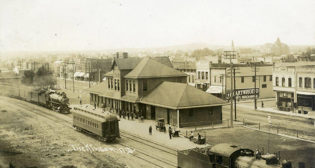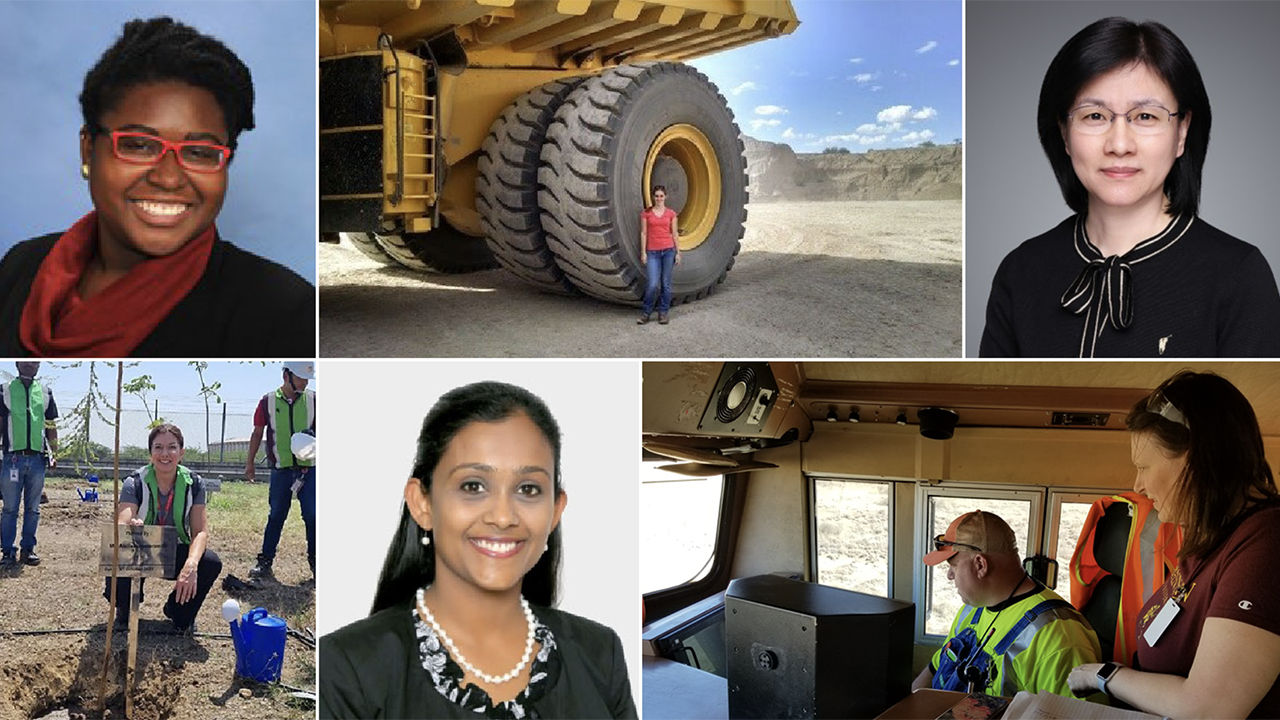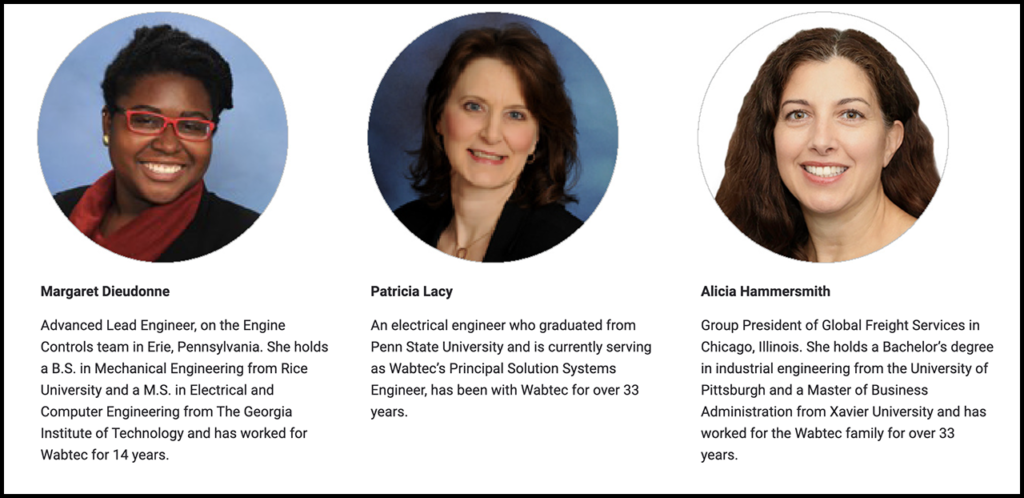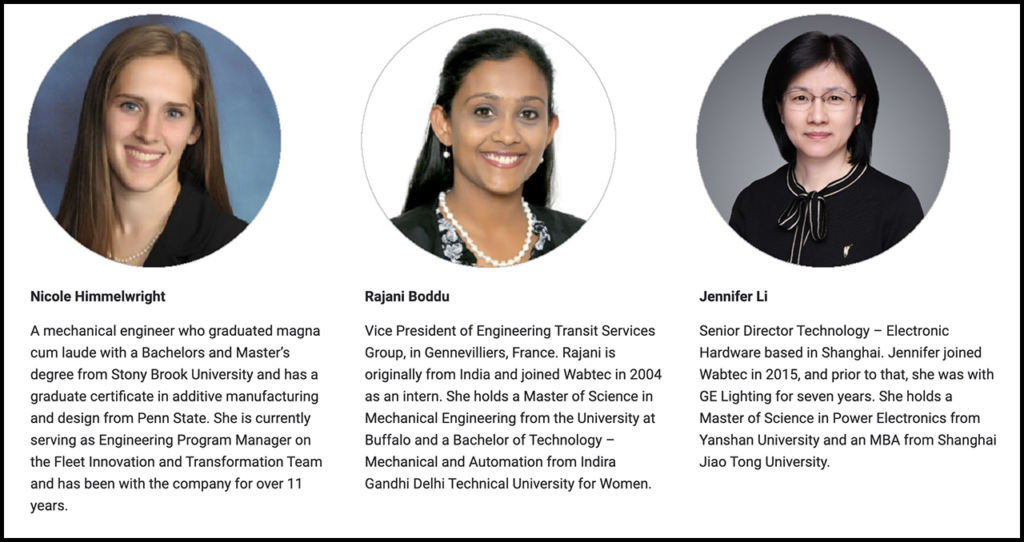
Female Engineers on a Mission
Written by Wabtec Corporate Communications
(Photo Collage Courtesy of Wabtec)
Engineering is a profession that has traditionally been male dominated. In fact, men outnumber women in the global engineering workforce 86.3% to 13.7% (Source: Fictiv). But for innovation to thrive, it requires a diverse, mission-driven culture where engineers from various backgrounds collaborate to solve the world’s biggest challenges.
As the world commemorates Women’s History Month, it presents an opportunity to highlight six female Wabtec engineers who have defied the odds. Many of these women own patents or they followed in the footsteps of their engineering parents or siblings. And while they have different journeys, many common themes emerged. These women share a hunger to solve problems—big, complex issues that take a lot of trial and error. They are not afraid to fail, not afraid of hard work, not afraid to be the only women in the room. They also believe in making a difference for our customers, and for our environment—this drives them. They are highly intelligent, rising through the ranks of Wabtec, driving special technical projects, being promoted, and succeeding. Meet these innovators and learn about their unique paths and perspectives.


Can you tell us about your childhood and why you pursued a degree in engineering?
Margaret: Growing up, I always wanted to be a doctor, a pediatrician specifically. But in high school, I took International Baccalaureate physics and thought, “this is actually pretty interesting.” It was then that I said, “You know what; I think I want to do engineering.” My mom was an engineer in Colombia where she’s from. She studied forestry engineering. And my dad, who’s from Haiti, studied geology. So, I come from a very science-heavy family. They had “the talk” with me and told me I could be an engineer, lawyer, or a doctor. In my current role, I focus on creating algorithms as well as developing strategies that a customer may request for their locomotive engines. Engine controls is very interdisciplinary.
Patricia: My father required all his kids to go to trade/tech school while still in high school. I did so and studied to become an electrician. After wiring up control panels and houses, I realized I didn’t want to be an electrician for the rest of my life. My two sisters were going to night school in engineering, and they encouraged me go to college full-time. Being pretty good at math, I felt I had two options: accounting or engineering. Since I already had the electrician part down, an electrical engineering degree was a natural fit for me. So, I kind of followed in my sister’s footsteps and it paid off.
Alicia: I didn’t start out in engineering. I was always good in math and sciences, and I chose to get a degree in pharmacy. I was doing exceptionally well but I realized that I didn’t want to be in a lab and work in a retail environment. I felt all I was doing in pharmacy was memorizing. So, I asked my father, who is a mechanical and electrical engineer, what I should do … and he said you like problem-solving, you should become an engineer!
With some prodding from him, I chose to be an industrial engineer as I liked the systems operations manufacturing and I wanted to be around people, that’s how I got my energy. My father didn’t treat me that differently from my brothers, so I was taught how to fix my car before I could drive it. I was taught how to build and fly model airplanes. I grew up believing that I could do anything “boys” could do.
Nicole: By training, I’m a mechanical engineer. That’s what I went to school for and it was my first job out of college, 11 years ago. I was fortunate that my family is full of engineers and medical professionals. I knew what engineering was growing up, or at least I had an idea.
At a pretty young age, I think they saw a difference in how I approached problems. I am hardwired in curiosity, have a natural aptitude for math and science, so I planned on going into biomedical engineering. I wanted to design prosthetics on the mechanical side. But once I was in college, the program wasn’t what I was looking for and I switched to mechanical engineering.
Working for my mechanical engineering degree, I was still working in robotics and structure. I ended up doing an internship with (GE) Wabtec my senior year and I fell in love with heavy industrial manufacturing and engineering. Walking into building 10 in Erie, Pa., and seeing the scale of what I could do was awe-inspiring to me. I grew up playing with Tonka trucks and was now going to work on these massive machines.
Rajani: I went into engineering not thinking of it as a “male” career. For me what was important was to be able to touch and feel the products and get out into the field. The things you can really touch are the mechanical components, in electronics its more hardware and software. I was drawn to do something that would keep me active and challenged. I need to have continuous butterflies in my stomach to strive for improvement in a role and keep learning. Once that stops, I’m stagnate. When I started, I was one of three women working on the floor (Patty Lacy and Christian Lau were the other two).
Can you tell us about your experience of being awarded a patent?
Margaret: I have one patent that got awarded to me last year, and one that I signed for a few months ago. So, one that’s confirmed. It was extremely rewarding. I cried at the end of my review, and it was easily my most technically challenging project. I had to learn so much about harmonics and frequency. These were things that I studied in school, but I need to learn much more. I honestly didn’t think I’d be able to work on something that was patent-worthy. I was also surprised at how few women there were at the Wabtec Patent Awards. It was a little eye-opening. I didn’t anticipate that.
Patricia: I have just over a dozen patents both in the U.S. and internationally in regions like Brazil, Canada, Mexico, and Australia. Whether it’s an engine or a digital product, whichever part of the business that you are working in, it’s important to protect our products from our competitors from entering the marketplace and we are supported and encouraged to do so. The patents I am most proud of are my team’s work related to our digital product, Trip Optimizer. One such patent is our design for replanning and reacting to changes along the route and adjusting our fuel optimized plan.
I have also worked very closely with AJ Kumar, who as you know, has a LOT of patents at Wabtec. Having collaborated with him over the years on many projects, he inspired and mentored me and is very helpful in writing and filing patents.
Nicole: Yes, it is really exciting. I currently hold two patents. When you are studying engineering in college, patents are talked a lot about. Everybody talks about Edison and his patents and of course all of the great innovative engineers out there. I thought it would be amazing to hold a patent, but I wasn’t convinced that I would ever get the opportunity. Not everybody gets to work for a company like Wabtec and specifically on teams that really drive innovation.
Rajani: I certainly had a lot of excitement around my four patents. My first couple of patents, I was a young engineer, and the principal engineers would review my concept as part of the process. I think that it is very special.
I spent a lot of time on the locomotive collecting information, validating and revalidating the solution. And this was the first project that I led. I also worked on a method and kit for engine emissions control. That was a lot of night shifts, trying to get the right ambient temperature to run the locomotive. All four of my patents are around engine performance, development and diagnostics.
Let’s talk about recruiting the next generation of female engineers.
Patricia: Trying to get more women to become engineers is a problem we are still trying to figure out. We need to help support the new women engineering students and help them accept that this is a hard field. You don’t have to have a 4.0 to be successful. And for young school-age girls, it is important that they are exposed to the idea of engineering and to real female engineers.
Margaret: I always say to those considering a career in engineering, think about how you are as a person. If you’re someone geared towards problem solving, who wants to get things done, who notices an issue and provides suggestions on how to improve it, you are probably a lot more geared towards engineering than you think.
Alicia: When I am mentoring young women entering college, I try to send them down the path and tell them to just go for it. If you are great in math and science, and you like solving problems, try engineering. If it doesn’t pan out, you can always change majors. As an engineering major, you will open yourself up to so many other opportunities, including scholarships and internships to help prepare you for success.
Nicole: I was recently at a local middle school, and I was asked by a girl if engineering is really hard. I told her, yes, it’s hard, it’s challenging. But I truly love my job. I like being able to tackle and solve challenging problems. I am not the type of person who likes to be bored. And seeing that I might bring a little inspiration to the younger generation reinvigorates me for my job too.
Do you face any stereotypes being a female engineer?
Alicia: It is so surprising how in 2024, women can still be dismissed. While touring colleges with my youngest daughter, our tour guide asked if any of us parents were engineers. I raised my hand, and she was very surprised. Also, the other day, when my son introduced my husband and me. The person we met turned towards my husband and started talking to him about being an engineer. My son interjected and said, they are both engineers, my mom is an engineer too.
Margaret: My physics teacher did not think I was going to be able to do engineering, even though I was in the top 2% of my class of hundreds. When I told him that I was applying to Rice University for their engineering program, he said he was surprised. But I didn’t let his doubt influence me, clearly!
Jennifer: The advice I provide to those I mentor is to keep learning. The key is to increase your capabilities, which will increase your confidence. Be curious, creative and confident. You can make it if you are eager to keep growing. And once you have a good foundation in engineering, or technology in general, build on that capability to think and learn better. Finally, expand your knowledge of finance and business operations to become a good engineering leader.
Rajani: Many times, throughout my career, I have been the only woman on my project, on my team, or in the lab. Often my emails are sent to “Mr. Boddu”—with the senders assuming I am a man. Once a vendor came to our facility to do some modifications and asked me to get Mr. Boddu. When I said, “I am Rajani Boddu, he had a very surprised look on his face!”
This article first appeared on the Wabtec Corporation website.
Railway Age Editor’s Note: Alicia Hammersmith was a Railway Age 2022 Women in Rail honoree.



